Dentures – Guilderland, NY
Lifelike Replacement Teeth for a Confident Smile
An estimated 40 million Americans are missing all of their teeth according to the American College of Prosthodontics. Tooth loss is an unfortunate reality for most people and can happen for a variety of reasons, including poor oral hygiene, genetics, and trauma. Fortunately, you don’t have to just accept that you’ll never have a complete and functional smile again, because Dr. Oshins offers lifelike, beautiful dentures in Guilderland to boost your confidence and improve your quality of life. Contact our office today to schedule a consultation and learn more.
Why Choose Oshins of Smiles for Dentures?
- Dentist is a Kois Center Graduate
- High-Quality Materials Used
- Insurance-Friendly Dental Practice
Who’s a Good Candidate for Dentures?

Ultimately, almost anyone with tooth loss can qualify for denture treatment. The exact number of teeth you’re missing doesn’t really matter. Still, booking a consultation with our office first is best. Dr. Oshins and his team will determine if you’re eligible for treatment. Even if you’re not, you could qualify later through various preliminary procedures. Should you want to learn more, just keep reading or call our office for the relevant details.
Effects of Missing Teeth

Before moving forward, it’s helpful to review the causes and effects of missing teeth. This process will let you see how dentures can help.
In terms of causes, people can lose teeth for various reasons. A relatively common one is tooth decay, leading to a pearly white falling out or needing extraction. Another one is gum disease – a condition that wears down the tissues securing teeth. It’s also possible for teeth to get knocked out from a sports injury or accident.
On the other hand, tooth loss effects are pretty consistent. Lacking teeth almost always makes eating, speaking, and smiling difficult. The situation also leads to smile gaps that gradually erode your jaw. (This erosion, in turn, can trigger facial collapse if left alone.) Spaces between teeth may even cause further tooth loss.
What Qualifies You for Dentures?

If you’re missing teeth, odds are you’ll qualify for dentures. That said, there are other qualifying factors to consider.
Your oral health is one such factor. For instance, a patient needs healthy gum and jaw tissues for dentures to work. A treatment candidate thus needs to practice good oral care. Similarly, you could get dentures for issues besides tooth loss. The prosthetics could replace your sensitive or decaying teeth.
The number of lost teeth is also worth noting. Based on how many are missing, you’ll need one of two possible dentures. The first is the partial denture, which only replaces a few teeth. Meanwhile, the second is the full denture. This latter kind replaces all the pearly whites along an arch.
It’d also be wise to account for your budget. After all, restorative dentistry isn’t free; it costs money as everything else does. On the bright side, dentures are more affordable than other restorations. They’re a great option for patients with limited funds.
Alternative Tooth-Replacement Options

It’s okay if you’re not a good candidate for dentures. As it happens, our team at Oshins of Smiles offers several other tooth replacement options. The most typical of these include the following:
- Dental Bridges – A dental bridge is a fixed restoration made of crowns fused to a pontic (i.e., false tooth). Due to relying on surrounding teeth for support, it can only replace a few pearly whites at most.
- Dental Implants – Dental implants are small titanium posts. Unlike other restorations, they’re placed in your jawbone and fuse with surrounding bone tissue. Given these qualities, a patient must have sufficient jawbone density. While more costly than dentures, implants are a more permanent and secure option.
Types of Dentures

Based on your smile goals and unique situation, you’ll be able to choose from any of the three types of dentures outlined below that we offer.
Partial Dentures

Partial dentures are designed to replace several missing teeth located across an arch. The metal and acrylic base is designed to fit like a puzzle piece in your mouth, being held in place by your existing teeth. Once secured, the attached replacement teeth will complete your arch, allowing you to eat and speak with ease.
Full Dentures

Full dentures can restore an entire row of missing teeth. The base is made from a gum-colored acrylic and designed to fit atop your jawbone ridge and utilize natural suction within the mouth to stay in place. The result is a complete and fully functional smile that can drastically improve your quality of life.
Implant Dentures

For patients who are interested in a more permanent and natural looking and feeling solution to replacing their missing teeth, Dr. Oshins can also secure a denture, bridge, or crown to dental implants. These are small titanium posts that are surgically placed below the gumline and into the jawbone to restore the entire structure of any number of missing teeth. The result is an unwavering, strong, and stable prosthetic.
How Dentures Are Made
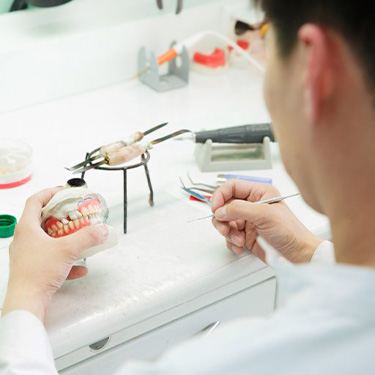
As one of the most reliable methods for replacing missing teeth, it’s easy to see how dentures provide a strong and natural-looking solution to help you regain your bite and smile. You also might even wonder how these prosthetics are created to fit your mouth perfectly. During your consultation, our team can walk you through the process as well as what the lab technicians will do to construct your custom dentures. Until then, here’s a brief look at how dentures are made.
What Are Dentures Made Of?
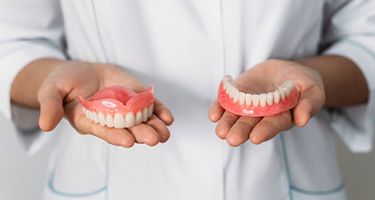
These personalized prosthetics are typically made up of artificial teeth and the base. Here’s what to know about each component:
- The Base: The foundation of the dentures is usually constructed out of acrylic due to its ability to closely mimic natural gum tissue. However, it can also be made out of resin, nylon, porcelain, or even involve some metal, such as with partial dentures. Not only is it designed to look like your normal gum line but it’s also meant to be sturdy for chewing food.
- Artificial Teeth: The teeth are commonly developed by using either resin or porcelain due to their capacity to reflect light the same way as natural tooth enamel. That said, since porcelain is incredibly durable and long-lasting, it’s usually the popular choice among patients.
The Denture Creation Process
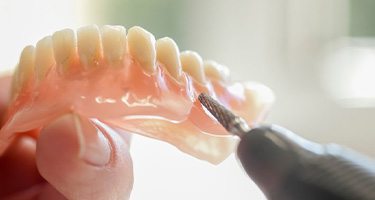
Creating traditional dentures takes time and precision to ensure that the final results match your unique mouth and provide the strength you require in the long term. Firstly, your team will take measurements and impressions of your gums and jawbone so that they can develop a plaster mold that mimics your mouth. These will be sent to a dental lab for construction, as the technicians will construct a wax model of your gumline to place artificial teeth into the base.
After reshaping the model so that it matches your exact specifications, they’ll send the wax denture to our lab for a fitting. If all looks well, your prosthetics will be sent back for completion. The lab technicians will then begin a multi-step process of replacing the wax material with plaster to hold the shape of your prosthetics before injecting them with acrylic. Once all the wax is gone, they’ll remove any excess acrylic by placing your dentures in an ultrasonic bath and then manually while they polish the final results. The final step is to send the dentures back to our office for a final fitting to confirm that your prosthetics are a perfect fit.
Our team can also offer immediate dentures, that way you don’t have to wait a couple of weeks to complete your smile. We’ll still take impressions of your mouth so that we can create the perfect fit, but you won’t have to bother with wearing temporary prosthetics. After a couple of hours or so, you’ll be able to show off your brand-new grin!
Adjusting to Your New Dentures

It should typically take some time for you to get used to wearing your dentures, especially since your gums won’t be accustomed to having anything resting on top of them. This could involve mild discomfort or soreness, but this should only be temporary. Over time, your dentures should feel more natural in your mouth while you chew your food and speak with others. Of course, time and practice will be essential for getting used to wearing them. You can also ask our team for a denture adhesive if necessary to help support your dentures during your adjustment period.
The Benefits of Dentures

By getting dentures to replace your missing teeth, you can be sure to enjoy being able to eat and speak more comfortably in the long run. However, these are only two of the advantages to expect from this treatment. Your prosthetics will offer much more life-changing results ranging from your oral health to your overall well-being. Read on to learn about the benefits of dentures.
Psychological Benefits

It can be difficult to accept tooth loss, especially if you’ve lost the majority or all of your teeth. Over time, this can reduce a person’s self-esteem and confidence. You may even feel less willing to engage in social events or activities, which can increase your risk of experiencing depression and sorrow. By restoring your smile with dentures, you’ll be able to return to showing off a grin you can be proud of. You’ll also significantly lower any anxieties you might have about your speech, chewing ability, and appearance.
Clearer Enunciation

Most people utilize their teeth to speak clearly, as the tongue and lips need to be positioned properly to enunciate. Without all of your smile, talking can become a difficult task. With dentures, you can regain the pearly whites necessary for clear speech. Of course, this may take some time as your mouth won’t be used to your prosthetics being present. But with time and practice, your new teeth should feel much more natural.
Improves Nutrition

Foods can come in a wide variety of textures, and even the healthier choices can be tougher to chew, especially if you’re missing most of your teeth. Without sufficient biting power, you can end up experiencing issues like malnutrition and indigestion. By wearing dentures, you can regain the majority of your chewing ability and expand your dietary options to include healthier meals. This is essential for promoting better oral health in the long run as you will receive the proper nutrients for your gums and jawbone.
Preserves Oral Health

If you still have some natural teeth after tooth loss, you might be at risk of having them shift out of place due to resorption. This is because the jawbone won’t have any stimulation from tooth roots, which are needed to preserve the facial structure. Dentures, however, can help keep the rest of your existing teeth in place. They’ll also share the weight of excessive pressure from chewing, significantly reducing the wear and tear of the rest of your natural smile.
Expands Opportunities

One of the most impactful things for your first impression is your smile. Having a full set of teeth can make others perceive you as more outgoing, competent, and attractive, especially since you’ll carry yourself with more confidence. If you’re missing some pearly whites, it can hinder some of your social and professional opportunities. Fortunately, dentures can easily boost your appearance, which, in turn, improves self-esteem.
Dentures Aftercare
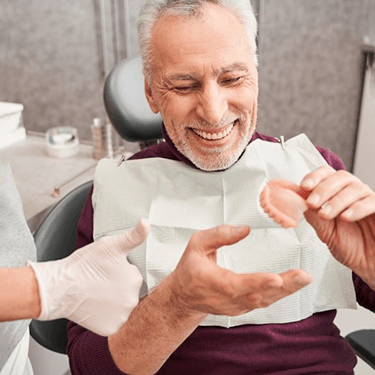
Not only will dentures replace missing teeth, but they’ll also improve both the function of your smile and your overall appearance. Once you’ve received your new pearly whites, you’re still going to need to practice proper care to make the most of them. With at-home care and regular visits to your dentist, you should be able to enjoy your new smile for many years to come. Here are several tips for caring for your dentures.
Removable Dentures

Remove After Eating
Whenever you’re done enjoying a meal, make sure to remove and rinse off your prosthetics. This will help keep them clean and free of food particles, bacteria, and plaque that can accumulate. Avoid using hot water as this can warp your dentures and make them ill-fitting.
Clean Your Prosthetics
Always remove your prosthetics before cleaning them. You’ll want to brush the underside of your dentures where they meet your gums, as this is the easiest place for bacteria to collect. Be sure to use a soft-bristled toothbrush to avoid wearing down your prosthetics and only use mild dish soap or denture cleanser to clean them with. Regular toothpaste can often be too abrasive for the material. If you aren’t going to wear them right after, store your dentures in a cup of water or denture solution to keep them fresh and moist so they won’t lose their shape. Also, rinse them again before wearing them, as you shouldn’t ingest cleaning products.
Keep Your Dentures Safe
When cleaning your dentures, you’ll want to avoid any possibility of accidentally damaging them. That’s why you should place a soft towel underneath them while you’re brushing them. This can help prevent them from breaking in case they slip out of your hand. Keep them out of reach from small children and pets.
Remove Dentures When You Sleep
Remember to take your dentures out before going to bed. Wearing them for too long can cause circulation in the gums to be restricted, leading to irritation and not allowing your tissues to receive essential minerals. Furthermore, those who sleep with their dentures have been associated with a heightened risk of gum/tongue plaque and pneumonia. To avoid these complications, take your prosthetics out and keep them in a cup of water or denture cleanser.
Notice Changes
Be sure to watch out for any changes in either your prosthetics or your mouth. Symptoms like mouth sores, gum irritation, or signs of infection will need to be addressed sooner rather than later. If you see any damage or notice something is off with your dentures, schedule a visit with your dentist for help. They’ll be able to either repair, realign, or even replace your prosthetics so you can return to a complete and healthy smile.
All-on-4 Dentures

Although All-on-4 dentures are similar to traditional ones, you won’t need to practice any special techniques. Simply use a soft-bristled toothbrush and clean them regularly with non-abrasive toothpaste (especially those that don’t contain baking soda or stain-removing substances). Use a floss threader to help clean between your dentures and your gums. Rinse with antibacterial mouthwash frequently to avoid plaque and tartar buildup.
Understanding the Cost of Dentures
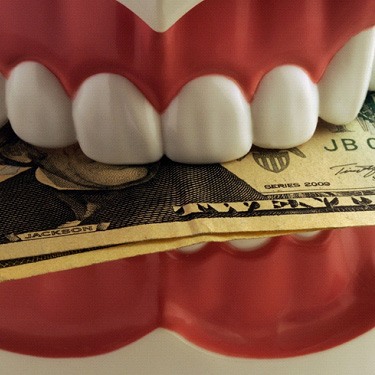
Dentures are a major investment in your oral health, and while they’re sure to pay off in spades, it’s also understandable to have questions about what you should expect your new prosthetic to cost.
Your prosthetic will be different from anyone else’s, which makes it a little bit difficult to tell you what your prosthetic is likely to cost without meeting your first. However, there are a few things worth thinking about if you’re in the process of trying to budget for treatment…
Factors that Affect the Cost of Dentures
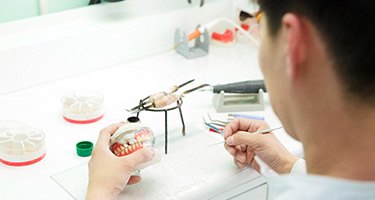
There are three main variables that will determine the cost of your prosthetic, and we’ll be able to talk you through each of them when designing what your dentures should look like.
First of all, you’ll have to account for any preliminary procedures that need to be done. Tooth extractions, for example, are important to think about if you’re budgeting for the overall cost of treatment.
Then there are the materials used for the prosthetic itself. There’s the acrylic base, which is colored to match the gums, and the teeth, which are made from either acrylic or porcelain. What materials you choose will come down to what you want from your prosthetic, and what you’d like to pay. Just keep in mind that the cheapest option isn’t always the best!
Are Implant Dentures More Expensive?
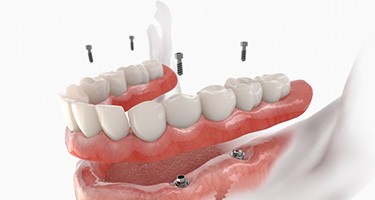
Implant dentures are the same as traditional dentures, except that instead of connecting to the gums via suction, they’re attached to metal posts that are surgically placed into the jaw. The surgery this entails will add to the cost of the prosthetic, though implant dentures also last longer than traditional prosthetics, which means that you’ll save money in the long run.
Does Dental Insurance Cover Dentures?

Dentures are vitally important to the people that need them, which is why dental insurance companies will typically cover at least a portion of the procedure. While every dental plan is different, most of them will cover around 50% of your prosthetic. We’ll spend time coordinating with your insurance company to ensure that you’re getting the most of your benefits.
Other Options for Making Dentures Affordable
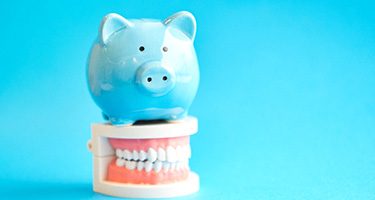
Even if you don’t have insurance, there are options available to make getting your prosthetic more affordable for you. We take CareCredit, which function a bit like a credit card specifically for healthcare. You can use it to pay for care up front then make payments later, providing a much more budget-friendly option for people who can’t afford to cover the entire cost at once.
We know that missing teeth can make life much harder, which is why we’ll work hard to help a high-quality set of dentures fit your budget. Give us a call today and we’ll be happy to talk to you about what financial options are available to you.
Dentures FAQs
What Qualifies You for Dentures?
There are three different types of dentures, and they all have different requirements. Partial dentures are ideal for people who still have most of their teeth but have experienced tooth loss due to oral disease, malnutrition, or an accident. Full dentures are recommended for those who have experienced significant tooth loss and don’t have any healthy teeth worth salvaging. This can happen to people who have severe gum disease, bone loss, and other oral health problems. Implant dentures are great for patients who still have sufficient jaw density to support them.
Why Do My Dentures Smell?
Bacteria can become trapped in the nooks and crannies of your dentures (especially if they don’t fit properly). Denture wearers also tend to produce less saliva, therefore leading to dry mouth. This allows harmful bacteria to thrive and cause bad breath. You can avoid this by cleaning your dentures every day with a soft-bristled toothbrush and specialized cleaners. You should also brush your mouth, including your gums, tongue, cheeks, and palate. Soak your dentures in a disinfecting solution every night to keep them moist and wash away bacteria. Rinse your dentures after every meal to wash away food particles and prevent the accumulation of bacteria.
Will Dentures Change the Shape of My Face?
When you lose teeth, your facial muscles will start to sag. This can give your face a sunken appearance. Getting dentures helps to provide support to the facial muscles that have collapsed, therefore improving your appearance. Ill-fitting dentures may not give your facial muscles the proper support they need, so you should let us know as soon as you realize that your denture is no longer fitting as it should.
How Long Will You Have to Wait to Get Dentures After Your Teeth Are Pulled?
The average wait time to get dentures is between six to eight weeks. This is so your gums have a chance to heal as well as additional time to make sure that your dentures fit as they should. If you are getting implant dentures, you will need to wait four to six months for the implant to fuse with your jawbone via osseointegration. During your appointment with us, we can discuss your treatment plan in detail so you know what you can expect.
